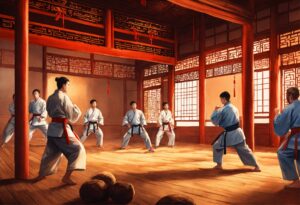
Aikido, often referred to as the “art of peace,” is a Japanese martial art renowned for its graceful movements and philosophy of non-violence. Rooted in the principles of harmony and fluidity, Aikido practitioners often emphasize the absence of luck in their practice. While luck may play a role in some endeavors, Aikido thrives on discipline, technique, and understanding, rendering luck irrelevant in its pursuit.
One of the core tenets of Aikido is the concept of blending with an opponent’s energy rather than opposing it directly. This principle underscores the importance of timing, awareness, and skillful execution. Aikido techniques rely heavily on precise movements and subtle adjustments to redirect an attacker’s force, leaving little room for chance or luck to influence the outcome.
In Aikido, practitioners dedicate countless hours to honing their skills through rigorous training and repetition. Techniques are practiced repeatedly to develop muscle memory and intuitive responses, allowing practitioners to react swiftly and effectively in a variety of situations. This meticulous approach to training minimizes the element of luck, as success is achieved through disciplined practice and mastery of technique rather than random chance.
Furthermore, Aikido places a strong emphasis on mental and emotional discipline. Practitioners are encouraged to cultivate a calm and focused mind, free from distractions and doubt. This mental clarity enables Aikido practitioners to remain composed under pressure and make split-second decisions based on years of training and experience, rather than relying on luck to guide their actions.

Instructors and senior practitioners often stress the importance of humility and respect within the Aikido community. Ego and arrogance have no place in the dojo, as students are taught to approach their training with an open mind and a willingness to learn from others. This emphasis on humility fosters a supportive and collaborative environment where practitioners can grow and improve without being hindered by notions of luck or chance.
Aikido’s philosophy extends beyond the physical techniques practiced in the dojo; it encompasses a way of life characterized by harmony, compassion, and self-improvement. By embracing the principles of Aikido both on and off the mat, practitioners cultivate a sense of inner peace and balance that transcends the need for luck or external validation.
In conclusion, the notion of luck holds little relevance in the practice of Aikido. Instead, Aikido thrives on discipline, technique, and a deep understanding of its principles. Through dedicated training, mental focus, and a commitment to personal growth, practitioners of Aikido can achieve mastery and find success without relying on luck to guide their path. As the founder of Aikido, Morihei Ueshiba, once said, “Aikido is not a technique to fight and defeat the enemy. It is a way to reconcile the world and make human beings one family.”

Leave a Reply
You must be logged in to post a comment.